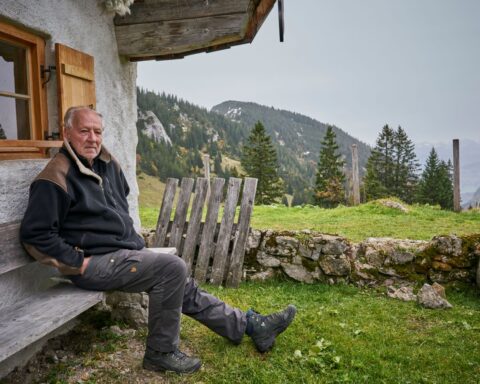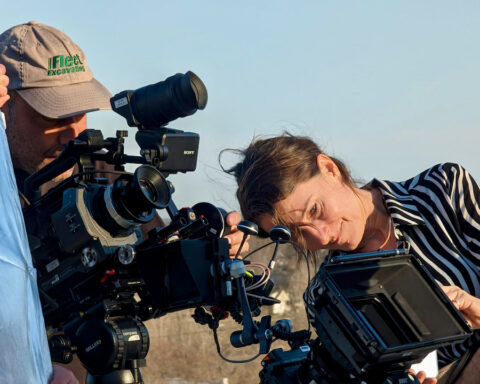Editor’s note: Canadian filmmaker and documentary programmer Dannielle Dyson attended the International Documentary Filmfestival Amsterdam (IDFA) for the first time last November. Here’s her point-of-view on the famed European doc fest, from the fresh perspective of a neophyte.
Without an international project to pitch at IDFA’s co- financing FORUM or the credentials for their Docs for Sale market, joining 150 other emerging filmmakers at IDFAcademy for classes loomed as an exciting way to spend my time in Amsterdam. Surrounded by multiple award-winning documentary directors and much sought-after industry professionals brought to light the reasons one becomes a filmmaker.
This three-day event at the Compagnietheater began with an opening speech by acclaimed Russian director Victor Kossakovsky, who won IDFA’s VPRO Joris Ivens Award and the Audience Award for his first feature Belovy in 1993. Ever the contrarian, Kossakovsky urged us all not to make films. In his 2006 Master Class, Kossakovsky’s number one rule for filmmaking was a paraphrase from Tolstoy’s advice on writing, “Don’t film if you can live without filming.” Kossakovsky equated the current overabundance of filmmakers to the availability of taxi drivers, saying that independent documentary work has become much too common compared to “20 years ago when every filmmaker was a brilliant, unusual and unique person.” This year he conceded, if you MUST be a filmmaker, vow to only “make GREAT films.”
During Werner Herzog’s first appearance in the 20 years of IDFA, his words for the 2007 Master Class restated this demand for great cinema that helps us find the “underlying truth” as does “great literature with a subtext of defining our human existence.”
At our Meet The Filmmaker session, Phie Ambo, who won the Joris Ivens Award in 2001 for co-directing the Middle East meets West romantic doc Family, spoke candidly about her newest film Mechanical Love, which was funded at IDFA’s FORUM in 2006 and then nominated for the Joris Ivens Award in 2007. She admitted that, “the reason not to become a filmmaker is that it has been very hard to make a living out of this … I think you have to have some kind of blind spot in your brain to actually choose to live your life like that! But then again, it’s also very privileged to wake up in the morning and do what you really love …”
There are just far “too many films for the market to absorb” said Jan Rofekamp, of Films Transit International at “The Ever-Evolving Documentary Marketplace” Industry Meeting. The Dutch-born, Montreal-based veteran agreed wholeheartedly that the fierce competition these days means the odds of success are a shot in the dark when so few films are theatrically released from the volume of material screened at the almost 4000 film festivals a year worldwide.
When concluding a Meet the Professionals round table discussion with our small group of attentive film- makers, Debra Zimmerman, from Women Make Movies, wished upon us the three pillars of documentary making success: to be able to establish a name for Fame, to have an impact on policy for Good Conscience and to find Fortune with OPM: Other People’s Money.
Fifteen years ago, the one-stop shopping for inter- national commissioning editors began at IDFA’s FORUM where today 90% of films pitched are funded.
At “The secrets of pitching? Who is who?” industry meeting, Steven Seidenberg, an executive producer and European Documentary Network [EDN] pitching coach, suggested using resources such as the EDN TV-Guide to find the right person to fund your project. “Who are the financiers that want to tell the same story that I want to tell?” is the question that Seidenberg asked to address when contacting commissioning editors. He advised us that during the actual pitch, we should focus on “where your passion is coming from for this project and what your skills are as a filmmaker” as “broadcasters will give money to people they want to work with and not necessarily the idea.”
Seidenberg’s theory proved true when Ethan Cox took to the stage with “The Art of the Fake” pitch and won commissioning editors’ approval despite being a fraud. Mastermind Peter Wintonick, who collaborated with Christoph Jorg from ARTE and others on the hoax, said the objective of this fake pitch was to “apprentice an ordinary person to see if we could make him (Ethan) into a filmmaker in six weeks.” Canada’s EyeSteelFilm documented the whole process in order to “try to figure out what qualities and characteristics are necessary these days to be a successful pitcher.” The tell-all short film was screened at IDFA.
Following IDFAcademy’s advanced screening of _Mechanical Love_, director and cinematographer Ambo displayed her pitching tools: a trailer and a one sheet. For Ambo the key element of her trailer was to create the “atmosphere of the film” with shots of people and robots interacting to reveal the theme of “what is emotion?” Secondly, Ambo emphasized that filmmakers should take the time to print out a one sheet as it is “important to show the investors that we actually mean this. We are showing them that we are taking the financial part of the filmmaking seriously and that we are going to make the film, no matter what.”
“The more broadcasters on board, the better,” said Barbra Truyen, a commissioning editor for VPRO in Holland, during “Who’s who in pitching?” She explained that when a smaller broadcaster “like Finland gives the blue stamp [of approval], this helps generate support” by showing confidence in a film project with international appeal.
Juggling broadcasters’ funds has created complex relationships for filmmakers, pointed out Rofekamp, since “distributors can take from six to ten months to release a film,” which is in direct opposition to those “broadcasters who are keen to broadcast ASAP.” The Films Transit CEO went on to encourage the filmmakers present to ask broadcasters to hold back on a broadcast date so that a film can gain a solid reputation on the festival circuit while competing for awards.
Rofekamp knows “broadcasters are the bread and butter for filmmakers” but he focused on a particularly onerous task for them: creating “five to six versions to satisfy different broadcasters.” With the European broadcast hour varying in each country, time slots can be 42 minutes or 53 minutes, 40 seconds or 69 minutes, in neighbouring nations. Combined with “figuring out each broadcaster to have the right angle” in terms of subject matter and language requirements, the filmmaker can become bogged down in details instead of creating the best doc.
To satisfy broadcaster demands and maintain artistic integrity, Ambo’s solution has been to “do a long master version that is the one running at festivals and in the cinema. Once I have made my master version, I’m not so uptight about the TV version because I know that I have made the version that I wanted to make from the beginning.”
Rofekamp said he prefers long format films with cinematic qualities that unfold on the big screen like fiction with a distinct “filmmaker signature.” That kind of pov doc isn’t always appealing to “broadcasters who … [prefer to] have observational looks at situations.”
To translate a scene to the big screen, Herzog said he maintains a good sense of physical spaces. The great German director likes to listen to what is going on in order to anticipate moves “like chess.” Herzog critiqued docs that start with “conceptual thoughts” since they usually produce an emotionless “conceptual film.” He described his approach to cinematography, which includes holding onto the belt of his strong cameraman to help him “step in synch” while facing the physical challenges of the jungle or the Arctic. He emphasized that “you do not establish the rhythm of a film during editing; you have to establish it during shooting.” For Herzog this can mean having a particular classical soundtrack already in mind while shooting. In some cases, an original music score was “created before any footage was ever shot.”
Ambo said that “you can take the audience much further artistically in the cinema than you can on the television. I think that if you want to work for the big screen, you need to have big ambitions to try to move people and use the room that they are sitting in. How you do that is completely individual.”
For me, a great film is always an inspiration. So were the many talented individuals who participated in IDFAcademics. There are a lot of hard truths in documentary pitching, marketing and broadcasting. But, as Phie Ambo noted, the reward is that you get to “do what you love.”











